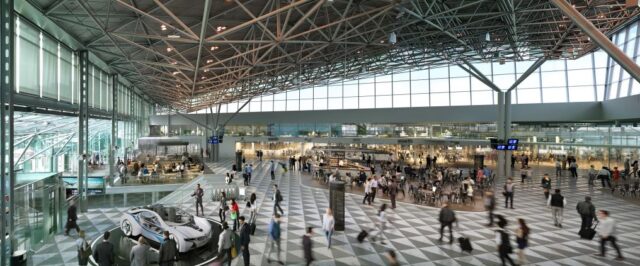Finavia is moving towards the final stages of the large development programme of Helsinki Airport. The investment programme that started in 2013, increases among other things the terminal area by 45%, growing baggage handling and passport control capacity by 50%. The investment strengthens Helsinki Airport’s role as a bridge between Europe and Asia, positioning the group to capture future demand. The development programme has been an opportunity for modernizing Finavia’s technology infrastructure, e.g. check-in and boarding systems with Amadeus as it supports Finavia’s aim to deliver an exceptional passenger experience.
Finavia serves more than 50 airlines that operate scheduled flights and their ground handling companies and has over 600 check-in desks at the airports. The airport company chose Amadeus Flow, an integrated cloud solution, to modernize all aspects of passenger handling including software, hardware and services.
With the new cloud platform, a single internet link connects Finavia’s airports to Amadeus where any airline application can be easily deployed in a matter of hours. Frictionless payment allows travelers to pay more easily with contactless technology. This is just one example of an additional innovation delivered via Amadeus and the first to be implemented. Amadeus’ Airport Pay solution will be deployed from the cloud allowing passengers to pay for ancillary services such as extra baggage or lounge access conveniently and in a contactless manner at all check-in desks.
The flexibility of the cloud infrastructure means that Finavia, airlines and ground handling companies can easily open, close or move check-in desks, boarding gates or services with agility in response to fluctuating passenger demand caused by COVID-19. This agility will also be used to better cope with seasonal demands at airports like Lapland, where passengers will be able to check in and even drop their bags from Lapland’s hotels in future.
Leyla Akgez-Laakso, CIO, Finavia said: “We’re moving to an open cloud platform with Amadeus and that means we can roll out new innovations far more easily, without lengthy certification cycles or on-site IT projects. We’re now well placed to add innovations like contactless payments quickly and easily without the need for Finavia to become a systems integrator. Airports are digitally transforming and I believe COVID-19 marks a tipping point where our industry goes cloud.”
Yannick Beunardeau, Vice President Airport IT, EMEA, Amadeus added: “The immediate pressures of COVID-19 and the demands of long-term digital transformation both require a new approach to airport technology. Airports need to be able to roll out new capabilities quickly and they need to be able to adapt services to changing requirements of passengers. By choosing to run its infrastructure from the cloud with Amadeus, Finavia is ready to innovate for many years to come.”
Discussing one of Finavia’s planned innovations Akgez-Laakso added: “Many of our regional airports are heavily seasonal, imagine Lapland in December. We have plans to harness the cloud to offer airlines a possibility to check in passengers at hotels, reducing queues and demand of services at the terminal.”
The major technology modernization will also see a full hardware refresh including 600 agent workstations, printers and scanners which are all fully integrated into the Amadeus Flow platform. The migration will begin to yield benefits during 2021 and is expected to be fully completed at 11 of Finavia’s 20 airports at the beginning of 2022.
Share this content:
This post was published on 18 March 2021 10:21 pm

